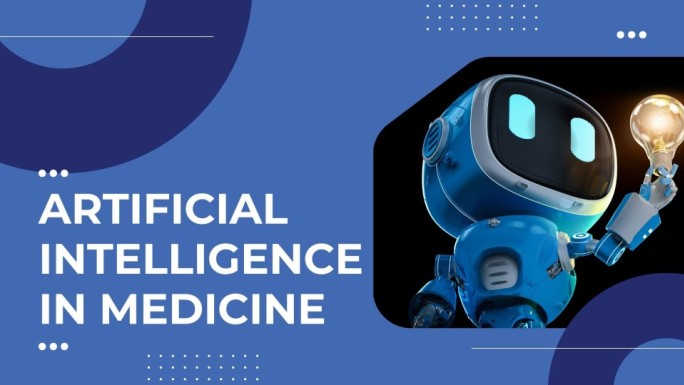Complete Understanding of Gen AI in healthcare
Generative AI (Gen AI) is rapidly transforming various industries, and healthcare is no exception. According to Precedence Research, Global Healthcare Gen AI market size is expected to reach $21.74 Billion in 2032. (35% CAGR). This powerful technology offers immense potential to revolutionize the way we deliver and experience healthcare.
In this blog post, we will explore the overview of Gen AI and deep dive into its applications in the healthcare sector.
I. Understanding Generative AI
Definition and key concepts of Gen AI
Generative AI (Gen AI) is a subset of artificial intelligence that focuses on creating new content, rather than simply analyzing existing data. Gen AI models can generate a variety of content, including text, images, audio, code, and more.
Unlike traditional AI, which is often used for tasks like classification, prediction, and recommendation, Gen AI is designed to generate new, original material. This is achieved by training the AI model on large datasets of existing content, allowing it to learn patterns and relationships that it can then use to create new content.
So Gen AI vs AI. What Is The Difference?
The table below shows the differences between gen AI and AI based on criteria. Let’s take a look!
|
Feature |
Gen AI |
AI |
|
Purpose |
Creating new content |
Analyzing data, making predictions, and solving problems |
|
Techniques |
Generative Adversarial Networks (GANs), Variational Autoencoders (VAEs), Transformer models |
Machine learning algorithms (e.g., decision trees, random forests, support vector machines) |
|
Examples |
Image generation, text generation, music composition |
Image recognition, speech recognition, recommendation systems |
|
Focus |
Creativity and originality |
Accuracy and efficiency |
|
Relationship |
Gen AI is a subset of AI |
AI is a broader term encompassing various techniques |
How Gen AI Works
Generative AI (Gen AI) relies heavily on deep learning techniques, a subset of machine learning that involves training artificial neural networks with multiple layers. These neural networks are inspired by the human brain, and they are capable of learning complex patterns and relationships within data.
Neural networks are composed of interconnected nodes or neurons, that process information. Each neuron receives inputs, performs calculations, and produces an output. The connections between neurons are weighted, and these weights are adjusted during the training process to optimize the network's performance.
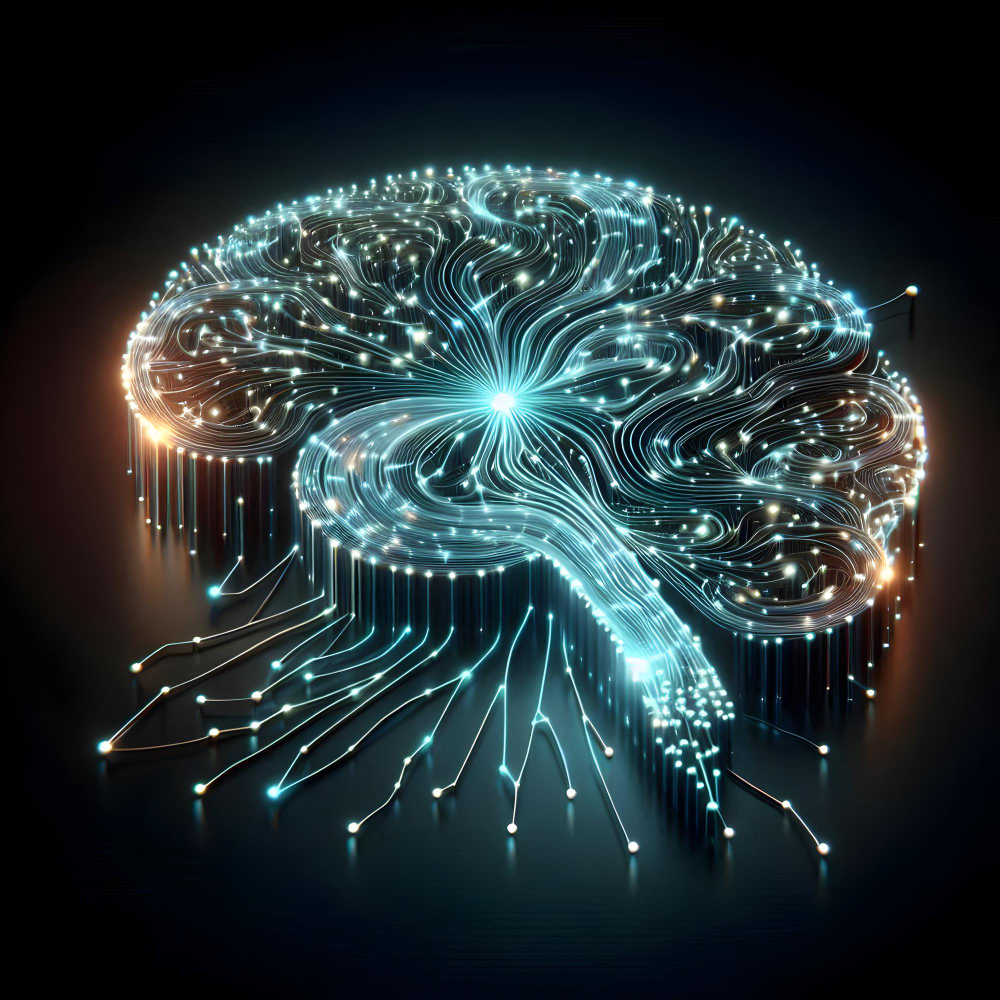
The training process of a Gen AI model involves feeding it a large dataset of existing content. The model learns to identify patterns and relationships within this data by adjusting the weights of its connections. Once trained, the model can be used to generate new, similar content.
Key techniques used in Gen AI:
- Generative Adversarial Networks (GANs): GANs consist of two neural networks: a generator that creates new content and a discriminator that evaluates the quality of the generated content. The two networks compete with each other, improving the generator's ability to produce realistic content.
- Variational Autoencoders (VAEs): VAEs are a type of generative model that uses probability distributions to encode and decode data. VAEs can generate new data samples that are similar to the training data.
- Transformer models: Transformer models are particularly effective for processing sequential data, such as text and time series. They use a mechanism called attention to focus on relevant parts of the input data.
II. Gen AI in Healthcare: Key Applications
According to Boston Consulting Group 2023, it can be seen that the application of GenAI has been implemented across most of the main players in the healthcare field, which are:
- Pharmaceutical firms
- Providers
- Payers
- Medtech
- Services and operations
- Public health agencies
These range from concept-stage applications to POC implementations and even solutions that have been deployed in practice. All applications help stakeholders increase efficiency and accuracy, ultimately improving patient outcomes
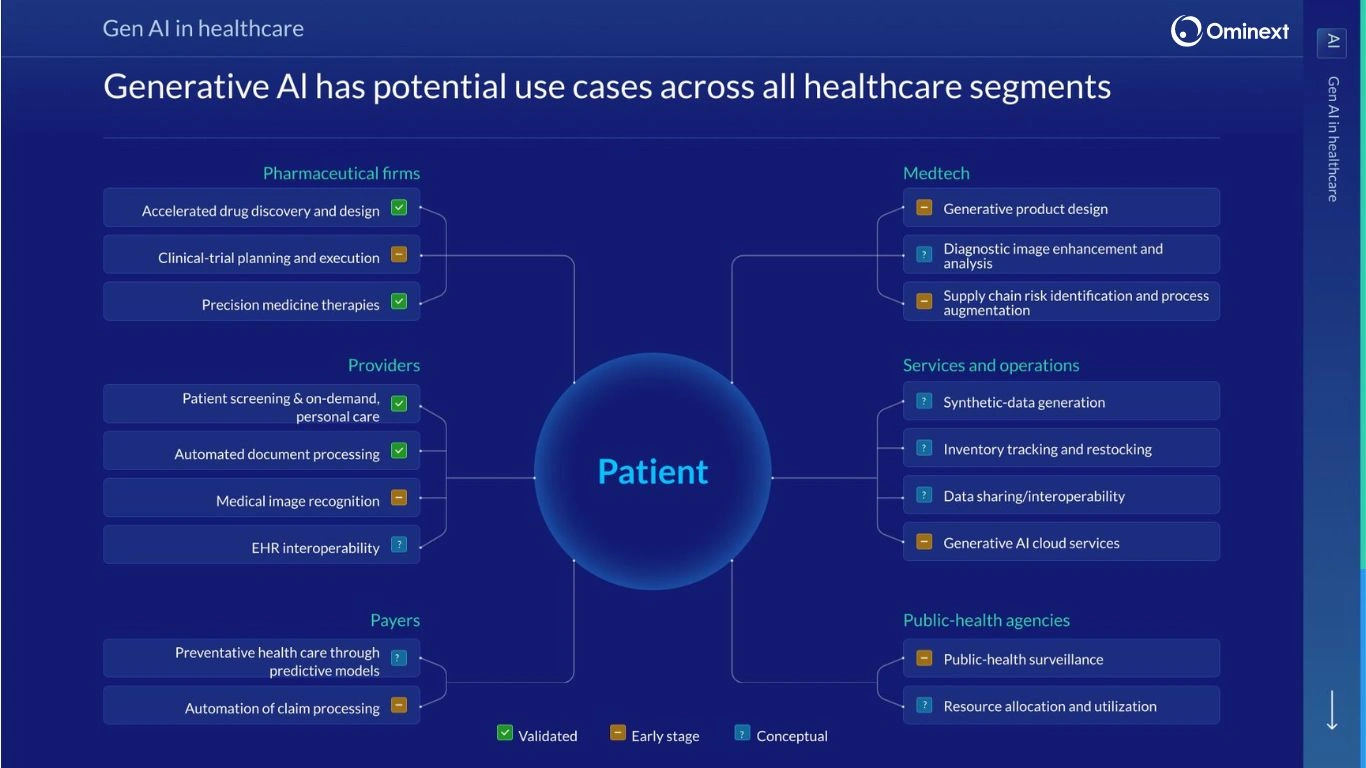
A. Validated Applications
1. Accelerated Drug Discovery and Design
Generative AI (Gen AI) has revolutionized the drug discovery process by significantly accelerating the identification and development of new therapeutic compounds. By leveraging deep learning algorithms, Gen AI can generate millions of potential drug candidates within a short timeframe, screening them for efficacy and safety. This approach has the potential to reduce the time and cost associated with traditional drug development, ultimately bringing new treatments to market more quickly.
2. Precision Medicine Therapies
Gen AI is playing a pivotal role in the advancement of precision medicine, which aims to tailor treatments to individual patients based on their unique genetic makeup and other factors. By analyzing vast amounts of patient data, including genetic information, medical history, and lifestyle factors, Gen AI can help identify the most effective treatment options for each patient. This personalized approach can improve treatment outcomes and reduce the risk of adverse side effects.
3. Patient Screening and On-Demand Personal Care
Gen AI-powered tools are being developed to enable early detection and screening for various diseases. For example, AI algorithms can analyze medical images, such as X-rays and MRIs, to identify abnormalities that may indicate the presence of cancer or other conditions. Additionally, Gen AI can be used to develop on-demand personal care applications, such as virtual health assistants that can provide personalized health advice and support.
4. Automated Document Processing
Gen AI can significantly streamline administrative tasks in healthcare by automating document processing. For instance, AI-powered systems can extract information from medical records, insurance claims, and other documents, reducing the time and effort required for manual data entry. This can improve efficiency and accuracy, ultimately leading to better patient care.
B. Early-stage Applications
Early-stage applications of Gen AI in healthcare include:
- Clinical-trial planning and execution: Gen AI can optimize clinical trial design, patient selection, and data analysis, accelerating the development of new treatments.
- Medical image recognition: AI algorithms can analyze medical images, such as X-rays and MRIs, with greater accuracy than human experts, leading to earlier detection and diagnosis of diseases.
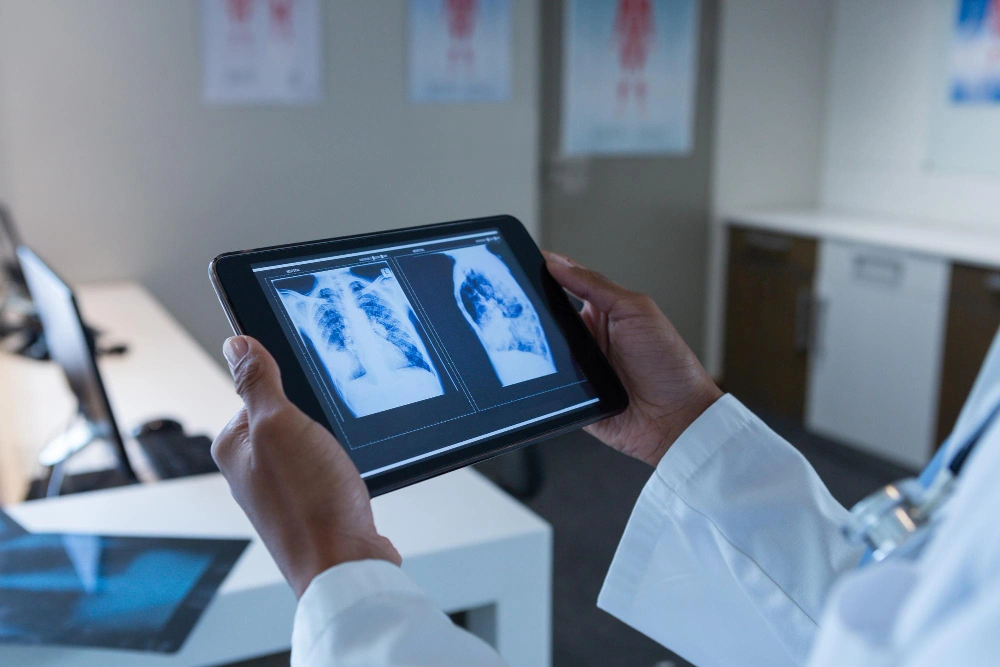
- Automation of claim processing: Gen AI can streamline administrative tasks by automating the processing of insurance claims, reducing errors and improving efficiency.
- Generative product design: AI can generate new designs for medical devices and equipment, optimizing performance and cost-effectiveness.
- Supply chain risk identification and process augmentation: Gen AI can help identify potential disruptions in the healthcare supply chain and optimize processes to ensure a reliable and efficient flow of medical supplies.
C. Conceptual Applications
Generative AI (Gen AI) has the potential to revolutionize healthcare by enabling new and innovative applications. In the conceptual stage, Gen AI is being explored for tasks such as:
- EHR interoperability: Gen AI can help bridge the gap between different electronic health record (EHR) systems, enabling seamless data sharing and analysis.
- Preventive healthcare through predictive models: By analyzing vast amounts of patient data, Gen AI can develop predictive models to identify individuals at risk of certain diseases, allowing for early intervention and prevention.
- Diagnostic image enhancement and analysis: Gen AI can improve the quality and accuracy of diagnostic images, aiding in the detection and diagnosis of diseases.
- Synthetic-data generation: Gen AI can generate synthetic patient data to train and test AI models without compromising patient privacy.
- Inventory tracking and restocking: AI can optimize inventory management in healthcare facilities by predicting demand and automating restocking processes.
- Data sharing/interoperability: Gen AI can facilitate data sharing and interoperability between healthcare providers, enabling more comprehensive and coordinated care.
- Resource allocation and utilization: AI can help optimize the allocation and utilization of healthcare resources, such as beds, staff, and equipment, to improve efficiency and reduce costs.
IV. Challenges of applying generative AI in healthcare
Data privacy and security
One of the major challenges in applying Gen AI to healthcare is protecting patient data from unauthorized access and misuse. Healthcare organizations must implement robust security measures to safeguard sensitive patient information, including medical records, genetic data, and personal information. This requires careful consideration of data storage, transmission, and access controls.
Bias and fairness
AI algorithms can be biased if they are trained on biased data. This can lead to unfair and discriminatory outcomes in healthcare, such as biased diagnoses or treatment recommendations. To address this issue, ensuring that the data used to train AI models is diverse and representative of the population is crucial. Additionally, ongoing monitoring and evaluation of AI systems are necessary to identify and mitigate biases.
Human-AI collaboration
The successful integration of Gen AI into healthcare requires a careful balance between the roles of AI and healthcare professionals. While AI can automate routine tasks and provide valuable insights, human judgment and expertise are still essential for making complex decisions and providing compassionate care. It is important to establish clear guidelines and protocols for human-AI collaboration to ensure that AI is used as a tool to augment, rather than replace, human capabilities.
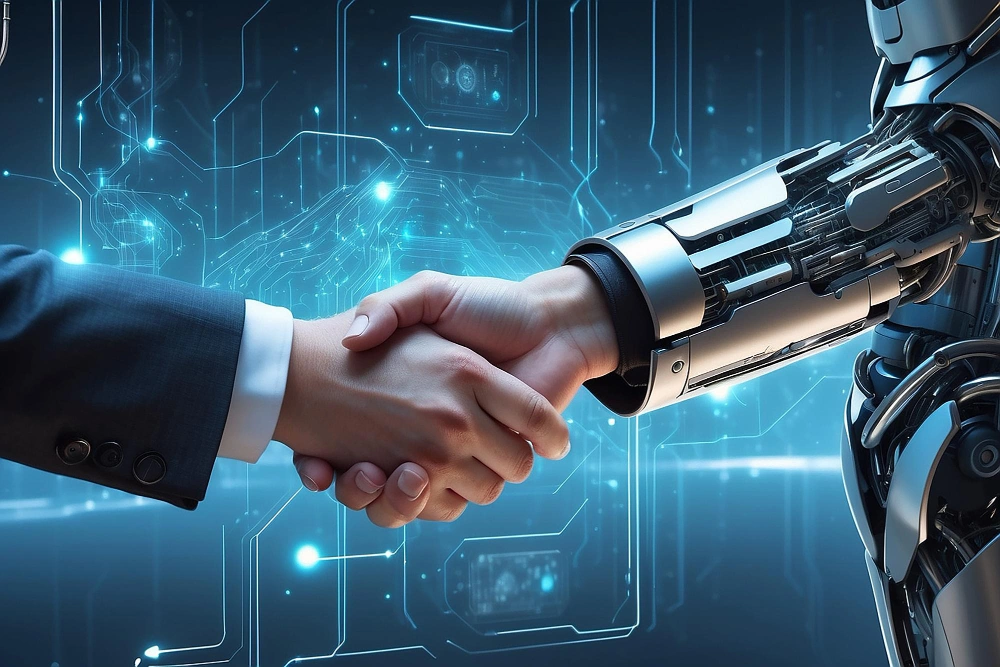
Regulatory and ethical frameworks
The development and use of Gen AI in healthcare raise several ethical questions, such as the potential for job displacement, the impact on patient autonomy, and the risk of unintended consequences. To address these concerns, it is necessary to establish clear regulatory and ethical frameworks that govern the development and deployment of Gen AI in healthcare. These frameworks should address issues such as data privacy, transparency, accountability, and the protection of patient rights.
Conclusion
Generative AI (Gen AI) has the potential to revolutionize the healthcare industry by improving efficiency, accuracy, and patient outcomes. From accelerating drug discovery to enabling personalized treatment plans, Gen AI offers numerous benefits that can enhance the quality of care.
However, the successful integration of Gen AI into healthcare requires careful consideration of ethical and regulatory implications. By addressing challenges such as data privacy, bias, and human-AI collaboration, healthcare organizations can harness the power of Gen AI to improve patient care and drive innovation.
As Gen AI continues to evolve, it is essential to remain at the forefront of this transformative technology. By understanding its potential and addressing its challenges, healthcare providers can position themselves for a future where AI plays a central role in delivering high-quality, personalized care.

